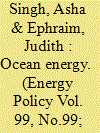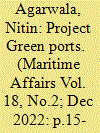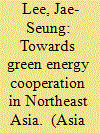|
|
|
Sort Order |
|
|
|
Items / Page
|
|
|
|
|
|
|
| Srl | Item |
| 1 |
ID:
177441


|
|
|
|
|
| Summary/Abstract |
The transition to a low-carbon economy poses significant challenges for investors in energy markets, entailing higher uncertainty and not just higher risks. On the back of the ongoing greening in investment preferences, we focus on investors' group behaviour with respect to U.S. energy equities, which lie at the crossroads in this energy transition phase from an old technology that relies heavily on oil, to a new, greener one. Based on a dynamic herding metric, we find that changes in investors' behaviour with respect to green asset allocations require a better information set than in the case of crude oil allocations, for which only information on returns is a relevant driver of behaviour. We argue that policy uncertainty is better than financial risk proxies in reflecting the multidimensional nature of uncertainty and the various risks associated with investing in green energy today. Our findings suggest the need to reduce uncertainty stemming from the policy realm, given its raising impact on investors’ portfolios on the back of higher allocations towards greener assets.
|
|
|
|
|
|
|
|
|
|
|
|
|
|
|
|
| 2 |
ID:
090536


|
|
|
|
|
| Publication |
2009.
|
| Summary/Abstract |
Greening the world will certainly eliminate some of the most serious risks we face, but it will aslo create new ones. A move to electric cars, for example, could set off a competition for lithium another limited, geographically concentrated resource. The sheer amout of water needed to create some kinds of alternative energy could suck certain region dry, upping the odds of resource based conflict.
|
|
|
|
|
|
|
|
|
|
|
|
|
|
|
|
| 3 |
ID:
149949


|
|
|
| 4 |
ID:
190734


|
|
|
|
|
| Summary/Abstract |
Seaports have evolved with changing technologies to ensure the handling of close to 80 per cent of global trade by volume and 70 per cent by value. As the ports have grown across the world, unabated pollution from numerous activities of ships, ports, industries, and infrastructure development has forced countries to focus on safe, efficient, and sustainable ports by focusing on community development to achieve cleaner harbours, skies, and soil. An effort of the Government of India for major Indian ports in this direction is Project Green Ports. Though the project was initiated in 2016, there is little update available about the project. It is to fill this gap that the article discusses the progress of the major Indian ports towards becoming green ports. In doing so, the article analyses the efforts made and the existing shortcomings to answer whether the Indian ports are on the right track to becoming green ports.
|
|
|
|
|
|
|
|
|
|
|
|
|
|
|
|
| 5 |
ID:
175960


|
|
|
|
|
| Summary/Abstract |
Armen Oganesyan, Editor-in-Chief of International Affairs: While the coronavirus epidemic may not have turned the world upside down, problems building up in various spheres of human life have reached a critical mass under its impact. Naturally, the energy industry, as an important sector of the world economy, has felt its effects. It is not only that the dramatic drop in oil prices occurred at the peak of the epidemic. The thing is that for a very short historical period, the world has reached a point where we must answer many questions and address many challenges of a global nature.
|
|
|
|
|
|
|
|
|
|
|
|
|
|
|
|
| 6 |
ID:
123593


|
|
|
|
|
| Publication |
2013.
|
| Summary/Abstract |
Faced with the dual challenge of depletion of fossil fuels and climate change, three Northeast Asian countries-China, Japan and Korea-introduced green energy initiatives in recent years. Even though the portion of renewable energy in the energy mix has been limited, a rapid shift to green initiatives has given a strong boost to renewable energy resources. Cooperation with respect to green energy in Northeast Asia (NEA) may eventually overcome the geopolitical constraints and zero-sum nature of the fossil fuel supply in the region. However, this cooperation also faces a number of obstacles to be overcome. Energy cooperation in NEA is still in an embryonic stage, and the level of institutionalisation is low. Green energy cooperation is not free from neo-mercantilist competition either, as the current green initiatives entail elements of strong industrial policy. European experience may shed light on the burgeoning green energy cooperation in NEA, in terms of methods and scope. The EU is currently adopting the most advanced policies on renewable energy and climate change. A series of green energy initiatives has provided a concrete platform for further green energy cooperation that could be pursued at the Union level. On the other hand, the history of European energy cooperation indicates that a long stage of market integration, institutional development and policy coordination are prerequisite. Northeast Asian green energy cooperation should be based on a continued momentum of green initiatives at the domestic level as well as the advancement of sub-regional institutional build-up. Regional multilateral institutions, such as Asia-Pacific Economic Cooperation, Association of Southeast Asian Nations Plus Three and ASEAN Regional Forum, as well as diverse international organisations and Track II institutions can provide a useful venue for Northeast Asian countries to share information and adopt a common position towards green energy cooperation.
|
|
|
|
|
|
|
|
|
|
|
|
|
|
|
|
|
|
|
|
|